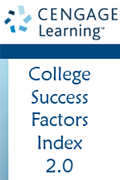Home | Products | Research | About Us | Contact Us | How to order
School Success Factors Index
The School Success Factors Index (SSFI) is designed for students in the 9th to 12th grades. It profiles each student's fundamental preparation to be successful in school and pinpoints those areas which need improvement.
The SSFI has been developed to determine the level of fundamentals related to school success. Particularly important is the measurement of those areas often overlooked by other research— the affective/cognitive fundamentals. Eight factors are measured. These factors are: responsibility taking; competition; task/precision; expectations; wellness; time management; school involvement; and family involvement.
Norm groups have been developed for the School Success Factors Index (SSFI) in each grade level (9-12), so that students may compare their scores to their peers. We are in our fifteenth year with high schools and gear-up programs throughout the country. This year our norm group has grown to well over 40,000 high school students. The correlation of the SSFI with high school grades is from r.=.35-.50.
Two popular programs are available utilizing the SSFI:
- SSFI booklets. Students fill in their responses in the booklet. The booklet is self-scored and the profile is provided on "Page 4" in each booklet for the individual student and counselor/instructor.
- SmartGrades.net. The electronic version of the SSFI allows students to take the instrument at home or in the resource center at the school. Immediate results are shown in the form of a bar chart and a print out suggests areas that need improvement and offers interventions.
An Early Alert component may be combined with the SSFI to compare student scores on nine different vectors. These vectors identify school areas that need institutional improvement and the results specifically pinpoint areas that individual students need to improve as well. Those students lacking these fundamentals are identified early in the school year and offered interventions to preclude their dropping out.







